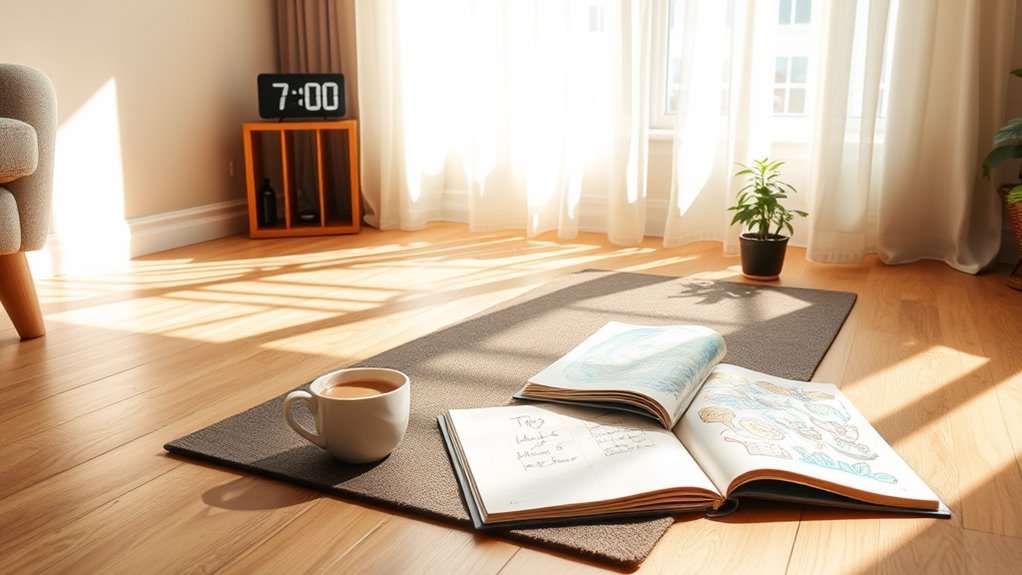How to Declutter Your Mind and Feel More Peaceful
To declutter your mind and feel more peaceful, practice mindfulness techniques like deep breathing and body scans to stay present. Journaling can help unravel overwhelming thoughts, providing clarity and self-discovery. Set clear boundaries to manage your time and energy, and embrace minimalism to simplify your environment. Incorporate gratitude practices to shift your perspective and create a calming routine that includes moments of reflection. Discover more strategies to enhance your focus and tranquility.
Key Takeaways
- Practice mindfulness techniques, such as deep breathing and body scans, to cultivate present-moment awareness and reduce racing thoughts.
- Engage in daily journaling to untangle your thoughts, gain clarity, and transform overwhelming emotions into insightful reflections.
- Set clear boundaries by communicating your needs and limits, enhancing emotional well-being and preventing misunderstandings.
- Embrace minimalism by decluttering your environment and commitments, prioritizing quality and intentionality over quantity.
- Incorporate a calming routine that includes gratitude practices and soothing activities to foster peace and reduce mental clutter.
Understanding Mental Clutter
Mental clutter is like a chaotic room filled with scattered thoughts and distractions. You know it’s there when you struggle to focus, your mind racing with unfinished tasks and overwhelming worries. This clutter can drain your energy and hinder your decision-making.
To achieve mastery over your mind, it’s essential to recognize the need for a mental detox. Start by identifying the sources of your clutter—negative thoughts, external stressors, or unproductive habits. Once identified, you can systematically eliminate these distractions.
Implement strategies like journaling or limiting your exposure to digital noise. By clearing this mental space, you’ll enhance your focus and creativity, paving the way for greater clarity and productivity. Engaging in effective strategies such as mindfulness or meditation can significantly support your mental detox journey.
Embrace the process of decluttering; it’s the first step toward a more peaceful mind.
The Power of Mindfulness
Clearing your mind of clutter opens the door to mindfulness, a powerful tool for enhancing focus and clarity. By practicing mindfulness, you cultivate an acute awareness of the present moment, allowing distractions to fade away.
You learn to observe your thoughts without judgment, creating space for deeper understanding and insight. This heightened awareness sharpens your focus, transforming mundane tasks into opportunities for engagement and mastery.
Embrace techniques like mindful breathing or body scans to ground yourself in the now. As you integrate mindfulness into your daily routine, you’ll notice an increased ability to tackle challenges with composure. Practicing breathing techniques can further enhance your ability to find relaxation and mental clarity.
Ultimately, this practice fosters a serene mindset, empowering you to navigate life’s complexities with poise and precision. Master your thoughts, and you’ll discover unparalleled peace.
Journaling for Clarity
Journaling can be a powerful tool for clearing your mind and gaining clarity. By exploring the benefits of writing, practicing effective techniques, and learning how to overcome writer’s block, you can access new insights about yourself. Let’s explore how to make journaling work for you. Incorporating effective journaling prompts into your practice can help you cultivate a calm and focused mind.
Benefits of Journaling
When you put pen to paper, you reveal a powerful tool for clarity and self-discovery. Journaling helps you untangle your thoughts, transforming overwhelming emotions into actionable insights. By articulating your feelings, you enhance self-awareness, enabling you to pinpoint patterns in your behavior and decision-making. This practice fosters mindfulness, allowing you to be present with your thoughts instead of being lost in them.
Moreover, journaling provides a safe space for reflection, encouraging you to confront challenges and celebrate victories. As you document your journey, you cultivate a deeper understanding of yourself, which can lead to personal growth. Additionally, incorporating daily affirmations into your journaling practice can further enhance your productivity and motivation.
Ultimately, this process not only declutters your mind but also empowers you to navigate life with greater intention and purpose.
Techniques for Effective Writing
Effective writing for clarity hinges on knowing how to express your thoughts concisely and authentically. One powerful technique is journaling, which helps you untangle your emotions and thoughts. Here’s a simple table to guide your journaling process:
| Emotion | Thought | Action |
|---|---|---|
| Overwhelmed | I feel lost | List priorities |
| Anxious | I worry about the future | Write affirmations |
| Frustrated | I’m stuck in my work | Set small goals |
| Inspired | I have a great idea | Outline your plan |
| Grateful | I appreciate my support system | Express thanks |
Incorporating daily affirmations into your journaling practice can significantly enhance your overall happiness.
Overcoming Writer’s Block
Writer’s block can feel like a heavy weight on your creativity, but it doesn’t have to hold you back. One effective way to break free is through journaling for clarity. This practice allows you to untangle your thoughts and find your voice again.
Here’s how to get started:
-
Free-write: Set a timer for 10 minutes and write without stopping; don’t worry about grammar or structure.
-
Ask questions: Write down what’s blocking you and explore your feelings around it.
-
Set intentions: Define what you want to achieve in your writing session, helping guide your focus.
Setting Boundaries
Setting boundaries is essential for maintaining your mental clarity and overall well-being.
You need to identify your limits and communicate them clearly to others.
Identify Your Limits
While it can be tempting to say yes to every request that comes your way, recognizing your limits is crucial for maintaining mental clarity.
Identifying what you can realistically handle helps you prioritize your well-being and focus on what truly matters. Here are three important aspects to reflect on:
-
Time Management: Assess how much time you can dedicate without feeling overwhelmed.
-
Emotional Capacity: Understand your emotional limits; it’s okay to step back when you need to recharge.
-
Energy Levels: Be mindful of your physical and mental energy; don’t commit to more than you can sustain.
Communicate Clearly
How can you effectively communicate your boundaries to others without feeling guilty? Start by being direct and honest. Use “I” statements to express your feelings and needs clearly. For example, say, “I need some quiet time to focus.” This approach takes ownership of your needs and prevents misunderstandings.
Practice assertiveness by maintaining eye contact and a confident tone. Remember, setting boundaries isn’t selfish; it’s essential for your well-being. If someone reacts negatively, stay firm and remind yourself that you’re prioritizing your mental health.
Be prepared to repeat your boundaries if necessary, as consistency reinforces your message. Ultimately, clear communication fosters respect, both for yourself and others, allowing you to cultivate healthier relationships and a more peaceful mind.
Practice Self-Care
Clear communication lays the foundation for practicing self-care, especially when it comes to setting boundaries. You must articulate your needs and limits, ensuring others respect them. This clarity not only protects your mental space but also fosters healthier relationships.
Here are a few strategies to help you set those boundaries effectively:
-
Identify your limits: Reflect on what feels manageable and what overwhelms you.
-
Be direct: Use clear language when expressing your needs; ambiguity can lead to misunderstandings.
-
Stay consistent: Reinforce your boundaries by sticking to them, even if it feels uncomfortable at first.
Embracing Minimalism
Embracing minimalism can greatly transform your mental landscape, allowing you to focus on what truly matters. By simplifying your surroundings and reducing distractions, you create a serene environment that fosters clarity.
Start by evaluating your commitments, possessions, and even thoughts. Let go of what no longer serves your purpose or aligns with your values. This intentional curation not only declutters your space but also streamlines your mind, enhancing your decision-making capabilities.
Prioritize quality over quantity in your relationships and activities, ensuring they enrich your life. As you embrace minimalism, you’ll cultivate a greater sense of peace and freedom, empowering you to pursue your goals with renewed vigor and intention.
Minimalism isn’t just a lifestyle; it’s a mindset shift toward mastery.
Practicing Gratitude
Although life can often feel overwhelming, practicing gratitude can shift your perspective and bring clarity to your mind. By acknowledging what you appreciate in your life, you create space for positivity, helping to declutter your mental landscape.
Here are a few effective ways to practice gratitude:
-
Daily Journaling: Write down three things you’re grateful for each day. This helps anchor your thoughts.
-
Mindful Reflection: Take a moment each morning or evening to reflect on positive experiences, no matter how small.
-
Express Appreciation: Share your gratitude with others. A simple thank-you can strengthen relationships and elevate your mood.
Incorporating gratitude into your routine cultivates a mindset that fosters peace and clarity, allowing you to navigate life with greater ease.
Creating a Calming Routine
When you create a calming routine, you set the stage for mental clarity and reduced stress. Begin your day with intentional moments—meditation or deep breathing can ground you. Choose a consistent time for these practices; consistency fosters mastery.
Incorporate activities that soothe you, like gentle yoga or nature walks, to enhance your focus. Establish boundaries around your time, limiting distractions from technology and noise. Schedule breaks to recharge, allowing your mind to reset throughout the day.
As you wind down, consider journaling your thoughts or reflecting on your gratitude. These practices create a tranquil evening ritual, preparing you for restful sleep. By committing to this routine, you empower yourself to maintain peace and clarity amid life’s chaos.
Frequently Asked Questions
How Long Does It Take to See Results From Decluttering My Mind?
It typically takes a few days to a couple of weeks to notice significant changes in your mental clarity and emotional balance. Consistent practice and dedication will accelerate your progress and deepen your results.
Can Decluttering My Mind Improve My Physical Health?
Yes, decluttering your mind can greatly improve your physical health. When you reduce mental clutter, you lower stress, enhance focus, and boost your immune system, leading to better overall well-being and energy in your life.
Is It Normal to Feel Overwhelmed While Decluttering Mentally?
It’s completely normal to feel overwhelmed while decluttering mentally. You’re processing thoughts and emotions, which can be intense. Embrace the discomfort as part of the journey towards clarity and focus; you’ll emerge stronger and more centered.
Are There Specific Techniques for Decluttering Thoughts During Stressful Times?
You can try mindfulness meditation, journaling, or prioritizing tasks. Focus on one thought at a time, breathe deeply, and challenge negative beliefs. These techniques help you regain control and clarity during stressful moments.
How Do I Maintain a Peaceful Mind After Decluttering?
To maintain a peaceful mind after decluttering, you consciously practice mindfulness daily, embrace gratitude, and set clear boundaries. Regularly reflect on your thoughts, ensuring you nurture positivity while gently releasing any lingering negativity. Stay committed to your peace.





